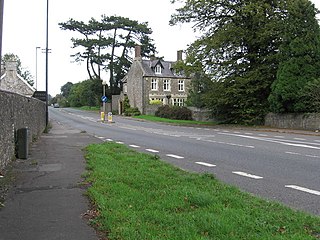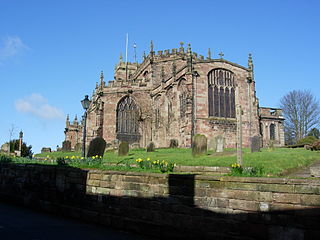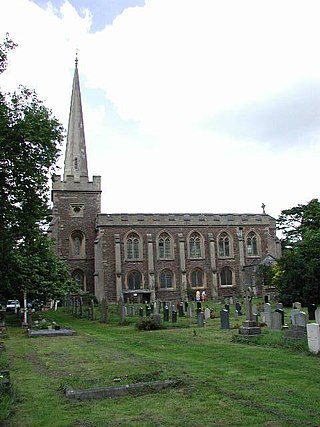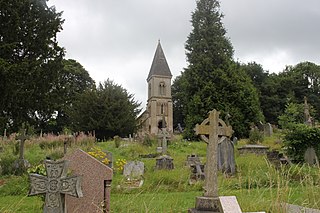
Rudgeway is a village in South Gloucestershire in south west England, located between Alveston and Almondsbury on the A38 trunk road. It lies west of Earthcott, Latteridge, Iron Acton and Yate on the B4059 road.

Box is a large village and civil parish within the Cotswolds Area of Outstanding Natural Beauty in Wiltshire, England, about 3 miles (5 km) west of Corsham and 5 miles (8 km) northeast of Bath. Box also falls in the easternmost part of the Avon Green Belt. Besides the village of Box, the parish includes the villages of Ashley and Box Hill; Hazelbury manor; and the hamlets of Alcombe, Blue Vein, Chapel Plaister, Ditteridge, Henley, Kingsdown, Middlehill, and Wadswick. To the east the parish includes much of Rudloe, formerly a hamlet but now a housing estate, and the defence establishments and related businesses on the site of RAF Rudloe Manor.

St Oswald's Church stands on the highest point in the market town of Malpas, Cheshire, England, on or near the site of a Norman motte and bailey castle. The church is recorded in the National Heritage List for England as a designated Grade I listed building and is recognised as being one of the best examples in Cheshire of a late 15th to early 16th-century church. It is an active Anglican parish church in the diocese of Chester, the archdeaconry of Chester and the deanery of Malpas. Its benefice is combined with those of St John, Threapwood, and Holy Trinity, Bickerton. Alec Clifton-Taylor includes it in his list of 'best' English parish churches.

Bishopsworth is the name of both a council ward of the city of Bristol in the United Kingdom, and a suburb of the city which lies within that ward. Bishopsworth contains many council estates.

St John on the Wall in Bristol is a historic church in the care of heritage charity The Churches Conservation Trust. The upper church and its medieval vaulted crypt is located at the lower end of Broad Street and is built into the old city's medieval walls.
There are 212 Grade II* listed buildings in Bristol, England.

Holy Trinity Church, Kingswood, is an Anglican parish church in Kingswood, South Gloucestershire, England. It has been designated as a grade II* listed building.

The Anglican Church of the Holy Trinity with St Edmund is a church on Wellington Hill, Horfield in Bristol, England. It has been designated as a grade II* listed building.

Cotham Church is a Gothic Revival style church in Cotham, Bristol, England. Since 1975, it has been a Church of England parish church known as the Church of St Saviour with St Mary or simply as Cotham Parish Church.

St Mary on the Quay is a Roman Catholic Parish church in Bristol, England. It is situated on Colston Avenue, next to Colston Tower in the centre of the city. It is the oldest Roman Catholic church in Bristol; the first one built after the Reformation. it was formerly administered by the Society of Jesus and is currently served by the Divine Word Missionaries. It is a Grade II* listed building.

St Mary the Virgin is a Church of England parish church in Henbury, Bristol, England.

St John the Baptist is a church in the Frenchay area of Bristol, England.

Cornwell is a small village and civil parish about 2.5 miles (4 km) west of Chipping Norton in the West Oxfordshire district of Oxfordshire, near the county border with Gloucestershire. The 2001 Census recorded the parish's population as 66.

St Wilfrid's Church is in Main Street, Melling, Lancashire, England. It is recorded in the National Heritage List for England as a designated Grade I listed building, and is an active Anglican church in the united benefice of East Lonsdale, the deanery of Tunstall, the archdeaconry of Lancaster and the diocese of Blackburn. Its benefice is combined with those of St Peter, Leck, St John the Baptist, Tunstall, St James the Less, Tatham, the Good Shepherd, Lowgill, and Holy Trinity, Wray.

St. Laurence's Church, Northfield is a parish church in the Church of England in Northfield, Birmingham. The church is in a conservation area near nail maker's cottages, the Great Stone Inn, the old school and the Village Pound.

The Anglican Bath Abbey Cemetery, officially dedicated as the Cemetery of St Peter and St Paul, was laid out by noted cemetery designer and landscape architect John Claudius Loudon (1783–1843) between 1843 and 1844 on a picturesque hillside site overlooking Bath, Somerset, England.

The Church of St John the Evangelist is a Roman Catholic church in the market town of Poulton-le-Fylde, Lancashire, England. The current church replaced an earlier chapel which lies a few metres to the north-east. The former chapel, with its attached presbytery, has been designated a Grade II listed building by English Heritage.

The English coastal city of Brighton and Hove, made up of the formerly separate Boroughs of Brighton and Hove in East Sussex, has a wide range of cemeteries throughout its urban area. Many were established in the mid-19th century, a time in which the Victorian "cult of death" encouraged extravagant, expensive memorials set in carefully cultivated landscapes which were even recommended as tourist attractions. Some of the largest, such as the Extra Mural Cemetery and the Brighton and Preston Cemetery, were set in particularly impressive natural landscapes. Brighton and Hove City Council, the local authority responsible for public services in the city, manages seven cemeteries, one of which also has the city's main crematorium. An eighth cemetery and a second crematorium are owned by a private company. Many cemeteries are full and no longer accept new burials. The council maintains administrative offices and a mortuary at the Woodvale Cemetery, and employs a coroner and support staff.

St Giles' Church is in the hamlet of Barrow, Shropshire, England. It is an active Anglican parish church in the deanery of Telford Severn Gorge, the archdeaconry of Ludlow, and the diocese of Hereford. Its benefice is united with those of All Saints, Broseley, St Mary, Jackfield, St Bartholomew, Benthall, and St Leonard, Linley. The church is recorded in the National Heritage List for England as a designated Grade I listed building. It is one of the earliest surviving churches in Shropshire, and contains the county's only Anglo-Saxon chancel.

St. Peter's Church is a former Church of England church in The Grove, on the Isle of Portland, Dorset. Designed by Major-General Sir Edmund Du Cane, the church was built in 1870-72 and is now a Grade II* Listed building. The gate piers and boundary walls to the north and west of the church are also Grade II Listed, along with the church's vicarage. St. Peter's Church is included on English Heritage's "Heritage at Risk" register.




















